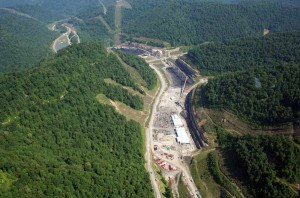- Like
- Digg
- Del
- Tumblr
- VKontakte
- Buffer
- Love This
- Odnoklassniki
- Meneame
- Blogger
- Amazon
- Yahoo Mail
- Gmail
- AOL
- Newsvine
- HackerNews
- Evernote
- MySpace
- Mail.ru
- Viadeo
- Line
- Comments
- Yummly
- SMS
- Viber
- Telegram
- Subscribe
- Skype
- Facebook Messenger
- Kakao
- LiveJournal
- Yammer
- Edgar
- Fintel
- Mix
- Instapaper
- Copy Link
Contact:
Sean Sarah, Sierra Club, 330 338-3740, sean.sarah@sierraclub.org
Dianne Bady, Ohio Valley Environmental Coalition, 304-522-0246, dbady.ovec@gmail.com
Cindy Rank, WV Highlands Conservancy, 304-924-5802, clrank2@gmail.com
Groups Highlight Failed Reclamation at Coal Mine
Mingo Logan Coal Company Violated Clean Water Act By Failing to Complete Stream Restoration
Charleston, WV – For the first time, environmental and citizen groups in West Virginia filed suit against a mine operator to enforce water quality certification protections. Mingo Logan Coal Company, the target of the suit, has failed to turn two diversion ditches (ditches that re-route streams destroyed by the mining) into functional streams at its Mountain Laurel Mine Complex in Logan County. The stream restoration was a condition of West Virginia approvals that cleared the way for the U.S. Army Corps of Engineers to issue a section 404 fill permit for the mine. Mingo Logan’s own annual status reports on the project admit that the ditches are not even capable of holding water, let alone meeting more stringent benchmarks for success in the approved mitigation plan. This litigation arguing that Mingo Logan has violated the Clean Water Act was brought by the West Virginia Highlands Conservancy, Ohio Valley Environmental Council and Sierra Club in the U.S. District Court for the Southern District of West Virginia.
“Before it would issue a water quality certification for this mine, the West Virginia Department of Environmental Protection required Mingo Logan to agree to create functional streams,” said Liz Wiles, Chair of the West Virginia Sierra Club. “Lo and behold, five years after the project was supposed to be finished we’ve got no streams and no effort by DEP to do anything about it.”
This case represents the first time that the groups are suing to enforce a condition in a Clean Water Act section 401 water quality certification. Before the Army Corps may issue a “dredge and fill” permit under section 404 of the Act, state regulators must certify that the proposed fill project will satisfy water quality requirements. State 401 certifications may, as in this case, be issued subject to certain conditions such as mitigation or stream restoration.
“The stream mitigation requirement was meant to offset the impacts caused by the mine putting over a full mile of streams into culverts,” said Dianne Bady with Ohio Valley Environmental Coalition. “Those permit conditions need to mean something, they can’t just be forgotten or ignored.”
“It’s unfortunate that it falls to citizens to hold these mines to account when they violate the terms of their permits. But most troublesome to me is knowing that even after 10 long years the company has failed to replace over a mile of what were once fully functional streams in the Seng Camp watershed,” said Cindy Rank with West Virginia Highlands Conservancy. “WVDEP or the Army Corps should have taken action to address this failure years ago.”
The groups are represented in this matter by attorneys Mike Becher and Joe Lovett of Appalachian Mountain Advocates, and Jim Hecker of Public Justice.
###








